By Askia Muhammad -Senior Editor- | Last updated: Jan 5, 2016 - 3:17:32 PM
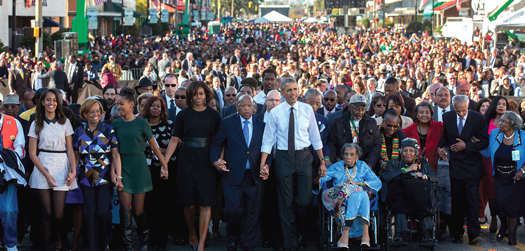
President Barack Obama and First Lady Michelle Obama join hands with Rep. John Lewis, D-Ga. As they lead the walk across the Edmund Pettus Bridge to commemorate the 50th Anniversary of Bloody Sunday and the Selma to Montgomery civil rights marches, in Selma, Ala., March 7. Photo: Official White House Photo by Lawrence Jackson
|
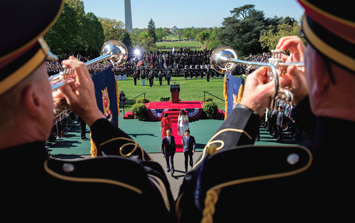
resident Barack Obama, First Lady Michelle Obama, Prime Minister Shinzo Abe of Japan and First Lady Akie Abe depart the State Arrival ceremony on the South Lawn of the White House, April 28, 2015. Photo: Official White House Photo/ David Lienemann
|
For his own part however, after seven years of brushing aside complaints from his staunchest supporters that race-hatred may be at the root of some of his most ardent opponents, Mr. Obama now admits that some of the most deep-seated hostility to his presidency and his policies is rooted in racial bias deep in the heart of the Republican Party.
“No politician, I think, aspires to 100 percent approval ratings,” the President told NPR’s Steven Inskeep in an interview which aired on Dec. 21. Mr. Obama was asked if he understood why some Americans are fearful about the direction in which he has led the country.
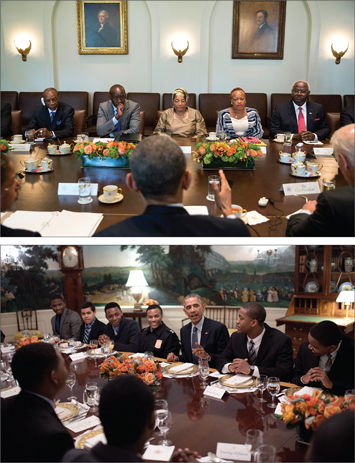
(Top Photo) President Barack Obama and Vice President Joe Biden hold a multilateral meeting with West African leaders regarding Ebola, in the Cabinet Room of the White House, April 15, 2015. Seated across from the President, from left, are President Alpha Conde of Guinea; Amara Konneh, Minister of Finance, Liberia; President Ellen Johnson Sirleaf of Liberia; Julia Duncan Cassell, Minister of Gender and Development, Liberia and President Ernest Bai Koroma of Sierra Leone. (Bottom Photo) President Barack Obama meets with My Brother’s Keeper mentees during lunch in the Diplomatic Reception Room of the White House, Feb. 27, 2015.
|
- “If you are referring to specific strains in the Republican Party that suggest that somehow I’m different, I’m Muslim, I’m disloyal to the country, etc., which unfortunately is pretty far out there and gets some traction in certain pockets of the Republican Party, and that have been articulated by some of their elected officials, what I’d say there is that that’s probably pretty specific to me and who I am and my background, and that in some ways I may represent change that worries them.”
Mr. Obama accused Republican presidential front-runner Donald Trump of exploiting anger and fear over economic insecurities among working class White men to propel his presidential campaign. “There’s going to be the potential for anger, frustration, fear—some of it justified but just misdirected. I think somebody like Mr. Trump’s taking advantage of that. That’s what he’s been exploiting during the course of his campaign.”
The very successes of the first Black president over the span of his first seven years in office may be the source of even more frustration for right-wingers and race haters. “That’s part of the American experience,” Mr. Obama said. “Pick any decade and this question’s been wrestled with. This has been true since the founding.”
The perception of Mr. Obama’s performance is also compounded among Black observers because he’s never been the openly “Brother President.” It’s very difficult to grade him, “because President Obama is merely the chairman of the board of the executive committee of the U.S. ruling elite,” Dr. Gerald Horne, who holds the Moore’s chair of History and African American Studies at the University of Houston, told The Final Call.
“Anyone who’s chaired a meeting knows, you either express the will of the body or you resign, or you’re ousted. So it’s difficult to evaluate President Obama, apart from an evaluation of the ultimate rulers of the United States of America.”
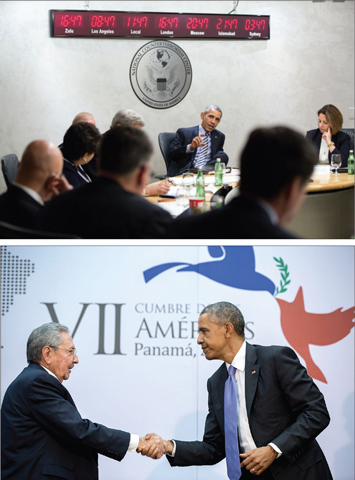
(Top Photo) President Barack Obama participates in a counterterrorism threat briefing at the National Counterterrorism Center in McLean, Va., Dec. 17. (Bottom Photo) President Barack Obama tours the National Cybersecurity and Communications Integration Center in Arlington, Va., Jan. 13, 2015. He is accompanied by Dr. Phyllis Schneck, Deputy Under Secretary for Cybersecurity & Communications, and Brig. Gen. Greg Touhill, (Ret.), Deputy Assistant Secretary for Cybersecurity Operations and Programs. Photos: Official White House Photo/Pete Souza
|
However, “if I were evaluating him strictly as an African American and looking at the needs of the African American community, the grades would be much different. I’ve had to recalibrate my assessment, because he’s the president of the United States, he’s a functionary of the United States government.”
Despite the obstacles in his path from a unified Republican opposition which set out from Inauguration Day 2009 to cause this president to fail, Mr. Obama was able to notch several victories. “He got substantive things done that were very heavy lifts and very much in opposition to conservative interests,” Dr. Leon continued, “one being the deal with Cuba where he has reopened the embassy with Cuba. He is in the process of normalizing relations with Cuba. I think the Iran nuclear deal is another very, very big accomplishment.
“The reason I think those things are significant is because there was and there continues to be incredible opposition from conservatives, from the Republican Party. He did something he normally doesn’t do, which is (to) stand tough against opposition, articulate clearly why what he’s trying to accomplish is important and in spite of those headwinds, he leaned into those headwinds and got it done.”
Progressive analysts universally praise the normalization with Cuba and the Iran nuclear deal, even when they have nothing else good to say about the Obama presidency. “There have been some extremely positive developments from the Obama administration, and that is the Iran nuclear deal and the Cuba opening,” Medea Benjamin, co-founder of Code Pink Voices for Peace said in an interview. “These were both done despite tremendous opposition, especially around Iran, and Obama pushed forward, so on that I think we should be very thankful.”
“I would rate him highly with regard to his approach to Cuba,” said Dr. Horne, “and with regard to the nuclear deal with Iran; with regard to climate change which is one of the most pressing issues on planet earth right now. So, overall, I would give him a mixed evaluation.”
Veteran political analyst and statistician Dr. David Bositis had mostly good things to say if he had to evaluate the Obama presidency. “Pretty good grades, a lot of positive things this year,” Dr. Bositis told The Final Call. “The agreement with Iran, the opening up with Cuba. The economy still has some problems, but on the other hand it is continuing to grow.
“The unemployment rate is going down. Starting on January 1st there will be a lot of increases in the minimum wage. There’s been a lot of discussion and a lot of movement, which Obama has been a part of adjusting the criminal justice process. The climate change agreement was a big deal. So there have been a lot of positive things,” said Dr. Bositis.
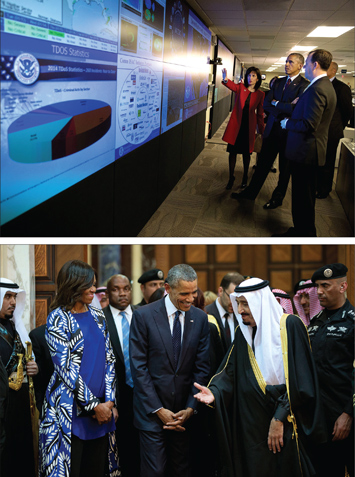
(Top Photo) President Barack Obama shakes hands with President Raúl Castro of Cuba during the Summit of the Americas at the Atlapa Convention Center in Panama City, Panama, April 11, 2015. (Bottom Photo) President Barack Obama and First Lady Michelle Obama walk with King Salman bin Abdulaziz of Saudi Arabia at Erga Palace in Riyadh, Saudi Arabia, Jan. 27, 2015.
|
But with the rise of fear in Washington and other Western capitals over barbaric acts committed in the name of the Islamic State—or ISIS, or ISIL, of Da’esh—Mr. Obama’s approval ratings have descended quickly.
“Oh, I would grade him as a ‘C-minus,’ particularly because I focus a lot on foreign policy issues,” said Ms. Benjamin, “and we’re still at war, perpetually. His whole administration has been war after war, and now we’re getting deeper into the wars he was supposed to have gotten us out of.”
But instead of succumbing to right-wing rhetoric which seeks a U.S. military solution to each and every international crisis, Mr. Obama should follow another course, according to Ms. Benjamin. “I wish we would maybe use Jeremy Corbin, the head of the Labor Party in the U.K. as our barometer for what a good politician’s position would be.
“He has constantly been of the opinion that the presence of foreign troops in the Middle East is a cause of continued violence, and there will never be an end to the wars as long as foreign military presence exists. So, if you look at the Obama administration’s record: he said he was going to get us out of Afghanistan, and then decided ‘No, can’t leave there, 10,000 remaining troops; he’s been fighting a war with Pakistan, low-key with drones; Libya war has been a disaster, absolute chaos there; Yemen, one (conflict) he said was a good example of U.S. military involvement, now, not only is there al-Qaeda, and ISIS in Yemen, but the good friend of ours, Saudis, are creating a humanitarian disaster in the whole country; Somalia seems to be a disaster with U.S. intervention; Iraq, well you know, who needs to talk about that; so that we destroyed that country; and then Syria; so, seven countries that Obama’s administration has been involved in militarily, and all (are) in terrible shape,” she said.
The Middle East quagmire is not going to be solved soon by any U.S. political leader, according to Dr. Bositis. “There is ISIS, but the fact of the matter is that (neither) Obama, nor any other political leader is going to control what happens in the short term, in Syria. It will eventually play itself out. It’s looking more and more like all the parties are getting bled.
“Obama was elected and promised when he was elected, that he was not going to be George Bush,” Dr. Bositis continued. “And so, by and large, he’s fulfilled that promise of not being George Bush. He’s raised taxes on the wealthy. Under his watch, the economy has clearly turned around from being the catastrophe it was in the spring of 2009 to where it is now.
“From initial missteps on foreign policy matters, I think on balance, he’s been more of a plus than he’s been a minus. We can point to a number of things that he’s done that have been positive things,” he continued. “Remember, ever since Obama was elected president, the Republicans have opposed everything he has wanted to do. They have not supported him. Listen to the Republican candidates, what’s wrong with the United States, what’s wrong with the world, it’s Barack Obama,” they say.
It appears that Mr. Obama’s last year in office will be a trying time. “It appears as though 2016, with the rise of quote-unquote ‘terrorism’ he could very well get consumed with what’s happening in Syria,” according to Dr. Leon, “what’s happening in Mali and some of the other African countries, not to mention this increase in domestic terrorism, so he could very well be consumed by terrorism in 2016.”
“I think Obama’s a reluctant warrior,” said Code Pink’s Medea Benjamin. “I think he doesn’t have the strength to really come out forcefully and say that the crisis in the Middle East dates back to the illegal mobilization of Iraq; that getting the U.S. military out of the Middle East is the best thing that can be done; that we need to put pressure on our ally Turkey to stop the recruits, and the money and the oil going back and forth to ISIS; and put pressure on our friends the Saudis—and I would say cut those friendly Saudi ties—so that we can actually move toward a policy in the Middle East where we’re not hypocrites, supporting the very country, Saudi Arabia that’s the source of so much of this extremism. “Will he do that? Unfortunately not.”
“There are always things that could happen that are unexpected,” Dr. Bositis predicted. “A war breaks out someplace, or something major breaks out someplace. A member of the Supreme Court retires or dies, there are things that could come up that we don’t know right now that are going to happen or not.
“In terms of his overall agenda, by the time a president gets into his eighth year, he’s not going to be undertaking any real new or major initiatives,” Dr. Bositis said. “My guess is he’s going to be defending, whether vetoing bills or encouraging others to support those positions.
“I think he’ll continue to talk out about the criminal justice system. I think he’ll continue to talk about voting rights and some of the problems that happen with voting rights. I also suspect in terms of the bully pulpit, he’ll be a little bit less constrained in his last year in terms of talking about some of the things that have been important to him, but in terms of any big new initiatives, I don’t see that happening. On the other hand, like I said, things can happen. In terms of his reacting to the things that happen, that’s another story since we don’t know what those things might be.”
The president’s final year in office may be dictated by the behavior of his Republican opponents, and the political process to choose his successor. Indeed, the so-called “Trump factor” in the 2016 campaign has breathed new life into the Ku Klux Klan, according to published reports.
In fact, a recent TIME magazine article said Mr. Trump’s words have been used as an “outreach tool” for KKK recruiters.
Indeed, the same rhetoric that frightens Mr. Trump’s critics draws praise from supporters such as former Louisiana politician and KKK Grand Wizard David Duke.
Mr. Duke told The Washington Post that while he has not officially endorsed Mr. Trump, he considers the candidate to be the “best of the lot” at the moment. “I think a lot of what he says resonates with me,” Mr. Duke said.
“The ultimate answer is, if this right wing cabal is to be confronted, you have to have leadership capable of mobilizing constituencies against it,” said Dr. Horne, “and President Obama has not done that. Now once again you could say he has not done that because he was apprehensive about how the right wing cabal would respond to our mobilization. After all, in previous decades they plunged the nation into Civil War, leading to the slaughter of thousands when they saw it being mobilized.”
So, what to expect from the White House in 2016 “is a very difficult question to answer,” Dr. Horne concluded.
“Well, one can only hope. One can hope that given the fact that he has only 12 months left in his term, and given the fact that there is a tendency as the example of Jimmy Carter suggests, for U.S. presidents to become more progressive once they are losing the reins of power.
“So one can hope that he will move in a more progressive direction in 2016, but the problem is of course, once again this right wing rebellion from the White grassroots, as symbolized by Donald Trump and Ted Cruz. It’s a very dangerous phenomenon. It does not bode well. One of the things we know thus far about President Obama, is that not only he, but many of the liberals that back him, are very reluctant to take head-on this White-right. And that does not bode well, even after Obama leaves office.”